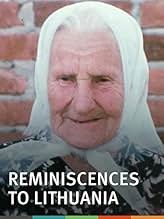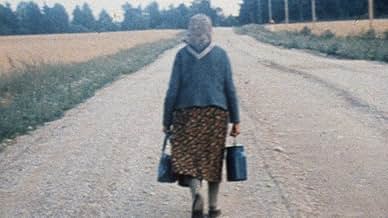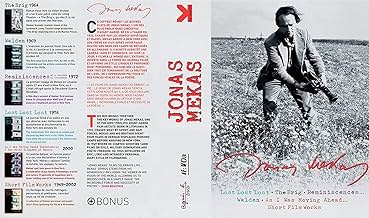Erinnerungen an eine Reise nach Litauen
Originaltitel: Reminiscences of a Journey to Lithuania
IMDb-BEWERTUNG
7,6/10
1305
IHRE BEWERTUNG
Füge eine Handlung in deiner Sprache hinzuFilmmaker Jonas Mekas creates an elegiac diary of a trip to his home country of Lithuania.Filmmaker Jonas Mekas creates an elegiac diary of a trip to his home country of Lithuania.Filmmaker Jonas Mekas creates an elegiac diary of a trip to his home country of Lithuania.
- Auszeichnungen
- 1 wins total
Ausgewählte Rezension
This is too distanced to connect to me. Here's the gist. Mekas returns to his homeland of Lithuania after so long, visits his old mother and old friends from school. Some things have changed, others have stayed the same, the way it always is. He follows his old mother around trying to capture, from his end, an ordinary day: the sitting and walking, the work.
Primarily, the problem is that for Mekas the images are intimate and familiar, emotionally charged, had to be since he is revisiting childhood here. But this is conveyed in a casual, almost indifferent way, a New York artist's way which is what Mekas was at this point. We experience this all in the same desultory way, from a filmic distance.
We only see him once in the film before the camera, and that is a cold image where he simply feeds logs to a fire where his mother cooks pancakes. Maybe there's a Lithuanian element here that I'm not able to reach. So I don't get the deep experience of the return, I get a diaristic snapshot of Lithuanian life. I don't see the returning son here, only the formal filmmaker. It's cold, without embrace.
Mekas had a famous falling out with Cassavetes in the early days, for reasons of narrative form in Shadows. I can only imagine the warmth and ragged truth of the film Cassavetes, a Greek, would have made about his return to the place of childhood.
This is interestingly reflected in the film here. Mekas is returning with his camera, looking to capture a slice of remembered life and contrasts. What happens all through the film is that people in spite of his efforts awkwardly arrange themselves to be filmed: they sing around the camera, his cousin's family poses for a photo. The very presence of the artificial eye creates artifice, disrupts the living flow.
Cool tidbit: we see at one point Wittgenstein's house in Vienna, the one designed by him. It's an ugly, cold, square thing, fittingly for a logician. Austrians are thinkers, taxonomists in the big dance of things, and Mekas, if nothing else, wants to film outside the logical box. The film ends with images of Vienna in flames, a fruit market burning, because, Mekas muses, the city doesn't want it, it wants to clear room for something modern.
Primarily, the problem is that for Mekas the images are intimate and familiar, emotionally charged, had to be since he is revisiting childhood here. But this is conveyed in a casual, almost indifferent way, a New York artist's way which is what Mekas was at this point. We experience this all in the same desultory way, from a filmic distance.
We only see him once in the film before the camera, and that is a cold image where he simply feeds logs to a fire where his mother cooks pancakes. Maybe there's a Lithuanian element here that I'm not able to reach. So I don't get the deep experience of the return, I get a diaristic snapshot of Lithuanian life. I don't see the returning son here, only the formal filmmaker. It's cold, without embrace.
Mekas had a famous falling out with Cassavetes in the early days, for reasons of narrative form in Shadows. I can only imagine the warmth and ragged truth of the film Cassavetes, a Greek, would have made about his return to the place of childhood.
This is interestingly reflected in the film here. Mekas is returning with his camera, looking to capture a slice of remembered life and contrasts. What happens all through the film is that people in spite of his efforts awkwardly arrange themselves to be filmed: they sing around the camera, his cousin's family poses for a photo. The very presence of the artificial eye creates artifice, disrupts the living flow.
Cool tidbit: we see at one point Wittgenstein's house in Vienna, the one designed by him. It's an ugly, cold, square thing, fittingly for a logician. Austrians are thinkers, taxonomists in the big dance of things, and Mekas, if nothing else, wants to film outside the logical box. The film ends with images of Vienna in flames, a fruit market burning, because, Mekas muses, the city doesn't want it, it wants to clear room for something modern.
- chaos-rampant
- 28. Juli 2013
- Permalink
Handlung
WUSSTEST DU SCHON:
- VerbindungenReferenced in A néni (2017)
Top-Auswahl
Melde dich zum Bewerten an und greife auf die Watchlist für personalisierte Empfehlungen zu.
Details
- Erscheinungsdatum
- Herkunftsländer
- Offizielle Standorte
- Sprachen
- Auch bekannt als
- Reminiscences of a Journey to Lithuania
- Drehorte
- Produktionsfirma
- Weitere beteiligte Unternehmen bei IMDbPro anzeigen
Zu dieser Seite beitragen
Bearbeitung vorschlagen oder fehlenden Inhalt hinzufügen

Oberste Lücke
By what name was Erinnerungen an eine Reise nach Litauen (1972) officially released in Canada in English?
Antwort
















